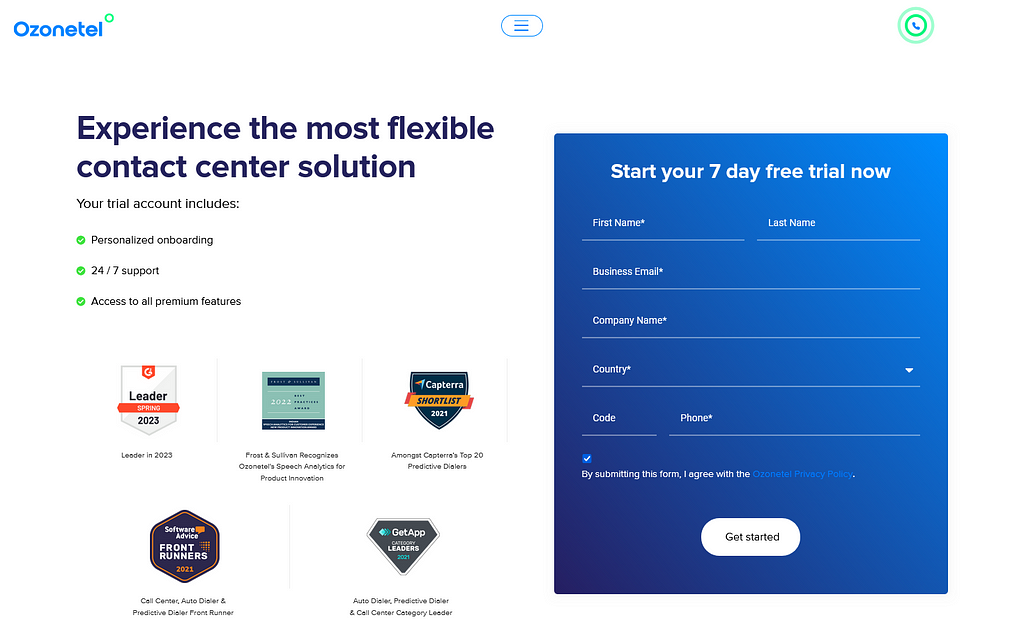- Resources
- Why Seamless CRM Integrations are Essential for Effective Call Center Solutions
Why Seamless CRM Integrations are Essential for Effective Call Center Solutions

Customer Relationship Management (CRM) has become a vital tool in the contact center, helping businesses enhance customer interactions and streamline processes. Here are four key statistics that demonstrate its significance:
- A Salesforce report states that 75% of customers anticipate consistent interactions across multiple channels (web, mobile, in-person, social) with a company.
- Research by Aberdeen Group indicates that contact centers using CRM software have a 74% customer retention rate, compared to 49% for those without it.
- A study by Nucleus Research shows that businesses can expect an average return of $8.71 for every dollar spent on CRM.
- PwC’s research reveals that 46% of customers solely rely on digital channels, and a significant 65% are prone to brand switching after a negative product or service experience.
To sum it up, these stats really drive home how crucial CRM has become in today’s contact centers. It’s all about meeting those ever-changing customer expectations, boosting customer retention rates, and getting a fantastic ROI. In this digital age, adopting CRM isn’t just an option; it’s a must-do for businesses.
Importance of Seamless CRM Integration
Seamless CRM integration is crucial for call centers to effectively manage customer data, automate sales and marketing activities, and improve overall efficiency. A well-integrated CRM system ensures that customer information flows smoothly between different tools, leading to better customer experiences and increased productivity for agents.
The Benefits of CRM Integration in Call Center Solutions
Integrating CRM systems into call center solutions offers numerous benefits, including automatic updates to customer information, streamlined processes, personalized communication, valuable data and analytics, and empowered agents. These benefits result in improved customer satisfaction, loyalty, and retention.
I. How CRM Integrations Automatically Update Customer Information
CRM integrations play a crucial role in maintaining consistent customer data across various channels and platforms. By automatically updating customer information in real-time, call center agents can access the most current and relevant data, such as customer history and preferences. Let’s check how this process helps
Real-time Data Synchronization: CRM integrations continuously update customer information in real-time, ensuring that agents are armed with the latest data. This includes crucial details like customer history, preferences, and interaction records.
Unified Customer Profile: By seamlessly syncing data across all communication channels, CRM integrations create a unified customer profile. Agents can gain a comprehensive understanding of each customer, facilitating tailored interactions.
Lightning-fast Responses: Real-time access to customer information empowers agents to swiftly address inquiries and concerns. Reduced response times significantly enhance overall customer satisfaction.
Contextual Conversations: Access to customer history enables agents to reference past interactions and purchases. This context-rich environment helps build rapport and trust during conversations.
II. Streamlining and Optimizing Call Center Processes
CRM integrations are pivotal in streamlining and optimizing various call center processes, resulting in improved efficiency, error reduction, and enhanced customer experiences.
Dialing and Routing Efficiency: CRM systems simplify dialing and routing, ensuring agents connect with the right customers promptly, reducing wait times, and minimizing misdirected calls.
Call Data Recording and Reporting: CRM integrations facilitate the recording and reporting of call data, enabling managers to analyze agent performance and pinpoint areas for enhancement.
Sales and Marketing Automation: Automating sales and marketing activities leads to higher conversion rates and increased revenue as agents focus on personalized customer service.
Efficient Issue Resolution: CRM integration allows call centers to efficiently resolve customer issues by providing a unified view of customer data, aiding quick access to relevant information.
Agent Performance Monitoring: CRM systems provide insights into metrics like call duration, resolution rates, and customer satisfaction, enabling managers to optimize operations and consistently deliver exceptional customer service.
III. Personalized and Proactive Communication with Customers
CRM integrations play a vital role in enabling personalized and proactive communication with customers, providing agents with a 360-degree view of customers. Here’s how it helps
- Enhanced Satisfaction: CRM offers a holistic customer view for tailored interactions, boosting satisfaction.
- Improved Loyalty: Agents understand customer needs, leading to loyal, long-term relationships.
- Effective Lead Nurturing: Access to complete customer data streamlines high-conversion lead nurturing.
- Spotting Upsell Opportunities: CRM identifies upsell potential, enabling targeted efforts and increased sales.
- Personalized Messaging: Automation delivers relevant messages, nurturing relationships and enhancing satisfaction.
IV. Harnessing Valuable Data and Analytics
CRM integrations provide call centers with valuable data and analytics that can be used to measure and improve various outcomes, such as conversion rates, revenue, and customer satisfaction. By harnessing this data, call centers can make informed decisions to optimize their processes and strategies.
Continuous Improvement: Analysis identifies areas for enhancement, tracking progress over time for competitiveness.
Upselling Opportunities: CRM spots potential upsells and high-conversion leads for increased sales and revenue.
Targeted Strategies: Data-driven insights enable tailored approaches to customer engagement and retention.
Competitive Edge: Utilizing CRM analytics keeps call centers agile, meeting evolving customer demands effectively.
V. Empowering Agents with Relevant Information, Insights, and Feedback
CRM integrations play a significant role in empowering call center agents with relevant information, insights, and feedback. The CRM tool provides efficient access to all necessary tools in one dashboard and enhances data security by preventing unauthorized access. Here’s how it helps
Efficient Workflow: Centralized tools in one dashboard improve efficiency, reduce errors, and enhance overall performance.
Authorized Access: CRM integrations ensure authorized personnel access sensitive customer data, maintaining trust and compliance.
Streamlined Data Management: CRM systems centralize customer data, communication channels, and performance metrics for efficient access.
Data Security: CRM integrations protect customer data, ensuring trust and regulatory compliance for call centers.
In summary, CRM integrations empower call center agents with the necessary information, insights, and feedback to perform at their best. This, in turn, leads to increased efficiency, improved customer satisfaction, and enhanced data security, ultimately contributing to the overall success of the call center.
Types of CRM Integrations
There are various types of CRM integration, each offering unique benefits for businesses. Three main types of integrations are native integration, third-party integrations, and custom integrations.
Native integrations: Native integrations involve pre-built connections within the same software ecosystem. These integrations do not require complex development, making them a convenient and cost-effective option for businesses that use compatible systems. Native integrations ensure seamless data flow between applications, enhancing the efficiency and accuracy of call center processes.
Third-party integrations: This type of integration connects different applications through the use of third-party tools or services. This type of integration is ideal for businesses that need to integrate applications from different software ecosystems. By leveraging third-party tools, businesses can achieve a high level of customization and flexibility in their CRM integration, ensuring that their specific needs are met.
Custom integrations: Developed specifically for a business’s unique requirements, custom integrations involve more technical expertise. This type of integration offers the highest level of customization and control, allowing businesses to tailor their CRM system to their specific processes and goals.
Understanding the different types of CRM integrations and their benefits can help businesses make informed decisions about their CRM strategy.
Challenges to Seamless CRM Integration
Customers expect consistent and seamless service across all touchpoints, whether they contact a call center via phone, email, chat, or social media. A well-integrated CRM system can help call centers meet these expectations and deliver a superior customer experience. However, there can be several hindrances to seamless integration including:
Data Silos: Data stored in isolated systems, preventing effective sharing and utilization across the organization.
System Incompatibility: Inability of different software or applications to work together cohesively, hindering data flow.
Lack of User Adoption: Resistance or non-acceptance of new systems by users, limiting integration’s effectiveness.
Data Quality Issues: Poor or inaccurate data quality affecting integration’s reliability and outcomes.
Integration Costs: High expenses associated with acquiring and implementing integration solutions, posing financial challenges.
Security Concerns: Worries about data breaches or vulnerabilities during the integration process, leading to cautious adoption.
How to Overcome challenges to seamless CRM integration
To address CRM integration challenges efficiently and effectively, businesses should implement following solutions:
Data Integration and Standardization: Unify customer data from various sources, maintaining consistent formats for accurate call center processes.
User Adoption: Provide comprehensive training and support to ensure agents fully understand and maximize CRM system use.
APIs and Integration Tools: Leverage these resources to connect CRM systems with other applications, streamlining workflow and enhancing efficiency.
Data Cleansing and Quality Control: Implement robust data auditing and cleaning procedures to ensure CRM data accuracy and prevent customer interaction issues.
Customization and Scalability: Select a flexible CRM solution that allows adaptation and expansion to meet evolving business needs in the call center industry.
In Conclusion
In summary, seamless CRM integrations are a necessity for call centers looking to improve their performance and achieve success in the competitive customer service industry. By leveraging CRM systems and addressing integration challenges, businesses can optimize their call center operations and consistently deliver exceptional customer service.
Ozonetel, with its open API architecture, seamlessly integrates with a wide array of business tools, including custom CRM and ticketing solutions. It offers dedicated integrations for popular platforms like Salesforce, Zendesk, Zoho, FreshDesk, HubSpot, Slack, and Kapture, among others. With a complete omnichannel contact center solution, Ozonetel empowers industries to manage communications effectively across numerous touchpoints and channels throughout the customer journey.
Seamless CRM Integration: Ozonetel’s plug-and-play approach ensures effortless integration with various CRMs, even custom-built solutions, simplifying the activation process.
Comprehensive Support: Ozonetel is committed to aiding growing businesses, offering 24/7 live phone support, free onboarding, and thorough training to ensure a smooth transition.
Value-Added Features: Beyond click-to-call, Ozonetel provides a robust set of features aimed at boosting outbound calling efficiency and optimizing call management—all without additional charges.
Cost-Efficient Solution: Ozonetel’s CRM integration and inclusive features make it a cost-effective choice for businesses looking to enhance customer interactions and streamline communication processes.
Ozonetel’s commitment to seamless CRM integration and support makes it a valuable asset for businesses seeking to deliver superior customer experiences.
Don’t Miss Out on Effortless CRM Integration with Ozonetel CX platform.
Frequently Asked Questions
CRM integrations offer numerous benefits for call centers, such as automatic updates to customer information, streamlined processes, personalized communication, valuable data and analytics, and empowered agents. These benefits lead to improved customer satisfaction, loyalty, and retention.
CRM integrations automate tasks such as updating customer information and managing sales and marketing activities. They also facilitate efficient communication between different tools, resulting in better customer experiences, increased productivity for agents, and reduced response times.
There are three main types of CRM integrations: native, third-party, and custom. Native integrations involve pre-built connections within the same software ecosystem, third-party integrations connect different applications through third-party tools or services, and custom integrations are developed for unique business needs. Each type offers unique benefits depending on the business’s requirements and existing software ecosystem.
CRM integrations empower agents with relevant information, insights, and feedback, leading to improved performance, motivation, and morale. They also enable personalized and proactive communication with customers, resulting in increased customer satisfaction, loyalty, and retention.
Common CRM integration challenges include data integration and standardization, user adoption, system compatibility, data quality, and scalability. To overcome these challenges, businesses should focus on data integration, encourage user adoption through training and support, leverage APIs and integration tools, implement robust data cleansing procedures, and select a CRM system that offers customization and scalability options.
Prashanth Kancherla
Chief Operating Officer, Ozonetel Communications
Over the past decade, Prashanth has worked with 3000+ customer experience and contact center leaders...
Chief Operating Officer, Ozonetel Communications
Over the past decade, Prashanth has worked with 3000+ customer experience and contact center leaders to comprehensively understand the need for effective and efficient customer communications at every step of their journey with a brand. Deeply embedded in today’s CCaaS ecosystem, he has been instrumental in Ozonetel's growth and contributed in various roles including product management, sales, and solution architecture.







